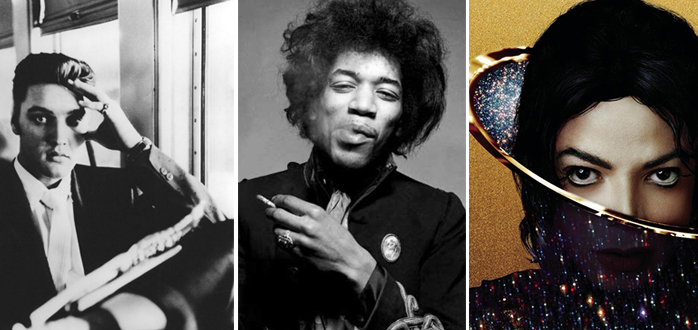Research shows music stars’ sales increase by 50% after death

“Death,” a wag said unkindly, “was Elvis Presley’s best career move.” After selling 300 million records during his lifetime, he sold that amount in the first seven years after his death.
In 2000, 23-years after he was supposedly found dead of a heart attack at his home (although we all know he’s in fact still alive disguised as one of the 198 Elvis impersonators who are working in Las Vegas), his estate earned $35 million from record sales, merchandising and licensing deals. According to Sony Music, he has now sold 1 billion records, 400 million of those outside the United States. Viva lost wages indeed.
The same could be said of Michael Jackson who has sold more albums in death than the last 13 years of his life. The King of Pop has shifted 13.2 million albums since his death in 2009, compared to 13.1 million from 1996-2008.
Jimi Hendrix went to the great jam session in the sky in September 1970. Since 1991, he has sold 15.5 million albums.
Now new research from three European academics, released overnight, saw a musician’s record sales can jump up by over 50% after they change their address to Kingdom Come.
Dr. Leif Brandes, Assistant Professor of Marketing at Warwick Business School in the UK said: “Our research indicates death-related publicity serves primarily as informational advertising that informs new customers. However, complementary survey evidence reveals that death-related publicity also triggers considerable nostalgic reactions and personal mortality salience – a feeling of their own mortality – from existing record-owners.
“This all leads to sales more than 50% up on figures pre-death. There is also a marked sales increase on an artist’s more critically well-received albums, which shows the importance of new customers for after-death sales figures.”
Collaborating with Dr. Brandes on Death-Related Publicity As Informational Advertising: Evidence From The Music Industry were Stephan Nüesch, of the University of Münster and Egon Franck of the University of Zurich.
The three surveyed 446 albums from 77 artists who died between 1992 and 2010. These including Michael Jackson, Wilson Pickett, Dusty Springfield, Aaliyah and Notorious B.I.G. They used sales information from music sales tracking company Nielsen Soundscan and experts’ evaluation of the quality of an album as featured on allmusic.com.
They found album sales increased on average by 54.1% in the four months after death compared to the four months before death. The relative increase in sales is higher for the artist’s critically acclaimed albums.
Dr. Brandes added: “While new customers are likely to cherry-pick from the best of an artist’s back catalogue, existing customers are likely to complete their collection with albums they did not buy before the star’s death. Therefore the new customers will look to best-selling items, whereas established customers might pick up rarer, less well critically received albums."
Less than 24 hours after Jackson's deaths, his records had filled everyspot in the Top 10 at Amazon.com. In the week after Whitney Houston’s death, in February 2012, she became the first woman to simultaneously place three albums in the top 10 of the US Billboard 200.
The three academics did an in-depth survey on the music consumption of more than 2,000 participants, focused on the albums of Jackson, Houston and Lou Reed.
Participants were asked which albums they purchased before and after the star's death, and given multiple options on why they bought the albums. Respondents were also asked about their emotional response to hearing of the artist’s death.
“Four interesting differences emerge across new and existing customers,” said Dr. Brandes. “First, and most importantly, new customers are more likely to buy items about which they did not know before the artist’s death. Second, new customers are more likely to buy items, because they want to finally own the artist’s best work. Third, existing customers showed stronger emotional reactions to news about the artist’s death, and were more often reminded about their own mortality.”
Two points are made to the music industry from the survey’s findings. Even the artist’s lesser quality albums will as a result be given exalted status. Retailers can spark off more sales by targeting customers with information on the dead star’s list of records.

































